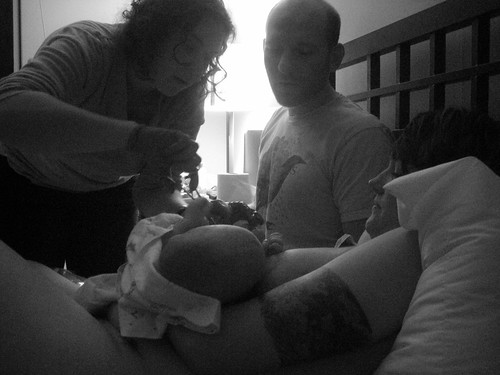
Some of my Ramadan reading has entailed the above, The Tao of Islam by Sachiko Murata. It is only through the materially deprived yet,spiritual uplifting state of fasting, that I can even hope to make sense of most of this book. She uses the Taoist formulation of yin and yang as a lens to look at Islam's theology around gender relations. It's fascinating. She has a most amazing chapter entitled, "The Womb." One of Allah's 99 names, ar-Rahman, or the Most Merciful one is closely related to the word for 'womb' in Arabic. There is so much depth and reflection on that alone, but for one more qualified than I! I wish to leave you with a few quotes relating ,of course to pregnancy, birth and mothers, all of which can be a wide opening into understanding the nature of the One who created.
There are four main sayings by the Prophet Muhammad, called hadith in Arabic, regarding the womb, which Murata uses towards the end of the chapter to exemplify the relationship between the nature of women, and Allah's Mercy. One of these that I particularly like is:
"God said, 'I am God and I am the All-merciful. I created the womb and gave it a name derived from My own name. Hence, if someone cuts off the womb, I will cut him off, but if someone joins the womb, I will join him to Me'"
The following passage on the station of mothers, was aid by Ali ibn al-Husayn, the grandson of the Prophet Muhammad.
"The right of your mother is that you know that she carried you where no one carries anyone, she gave to you of the fruit of her heart that which no one gives to anyone, and she protected you with all of her organs. She did not care if she went hungry as along as you ate, if she was thirsty as long as you drank, if she was naked as long as you were clothed, if she was in the sun as long as you were in the shade. She gave up sleep for your sake, she protected you from heat and cold, in order that you might belong to her. You will not be able to show her gratitude, unless through God's help and giving success." (pg 213)
In reflecting on gestation and birth and how it relates to the grave and death, and the life after this, Sachiko Murata writes:
"Human beings develop in the womb in a manner that parallels the order followed by God in creating the macrocosm. In the womb the infant grows to completion and reaches deliverance by dying to the womb in order to be born into the world. In the world the human being grows to spiritual perfection and reaches deliverance through death to this world and birth into the next."
In keeping in this vein of reflecting on birth in this life with birth in the next, Murata quotes a Rumi poem. Here, he is comparing pregnancy and birth to a death, and encouraging us to live by the quote of Ali to "Die before you die", this of course, referring to the death of the ego. Like labor, this is an incredible challenge on all levels.
"Although the mother suffers the pain of childbirth, the embryo breaks out of prison.
The woman weeps at the birth: "Where is the refuge?" The child laughs: "Deliverance has come!"
Until mothers feel the pain of childbirth, the child finds no way to be born.
The Trust is within the heart and the heart is pregnant: all the exhortations of the saints act as a midwife.
The midwife says, "The woman has no pain. Pain is necessary, for it will open a way for the child."
I hope these quotes inspire you in these waning days of Ramadan. Please remember me and my family in your prayers!



